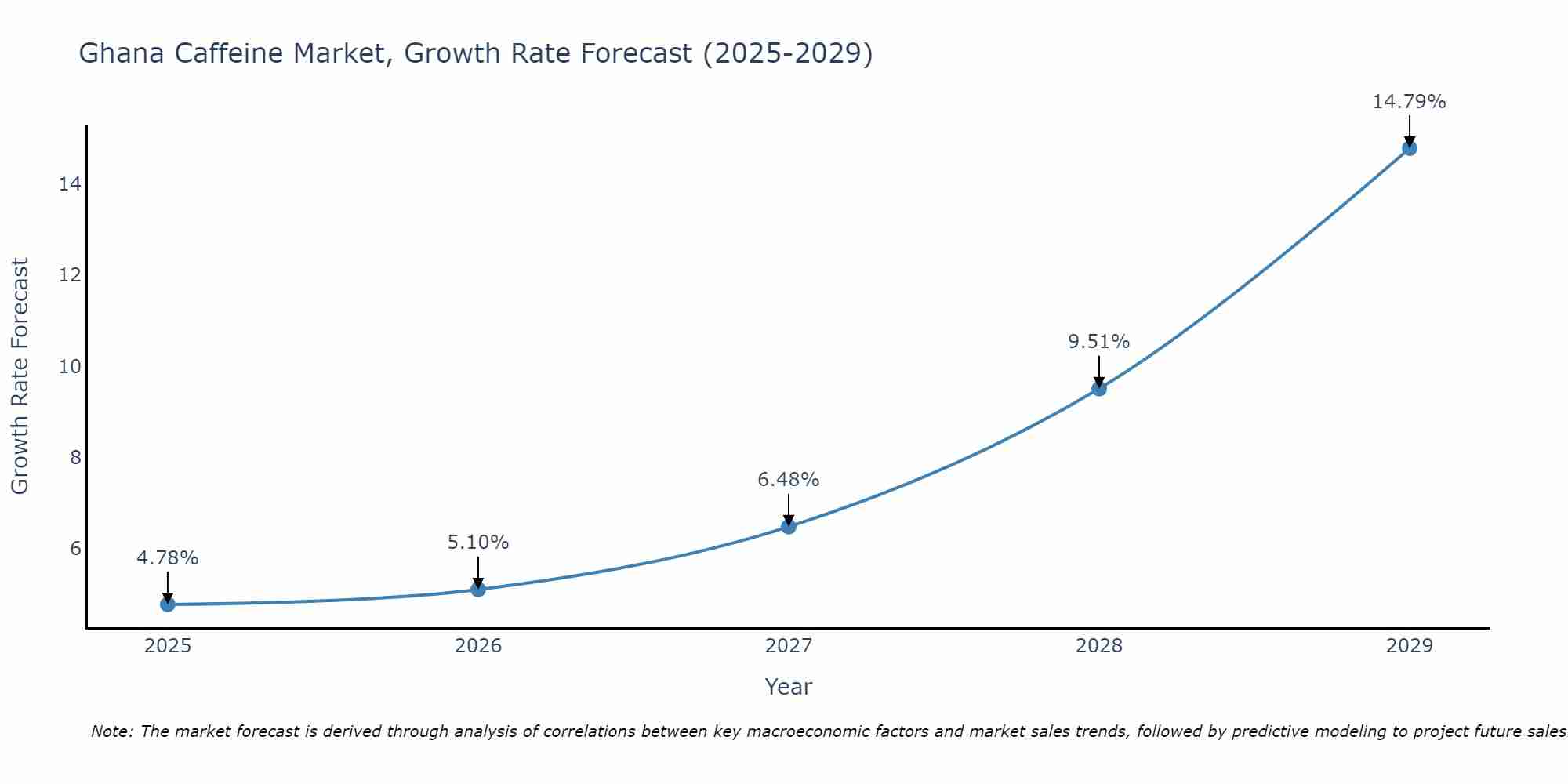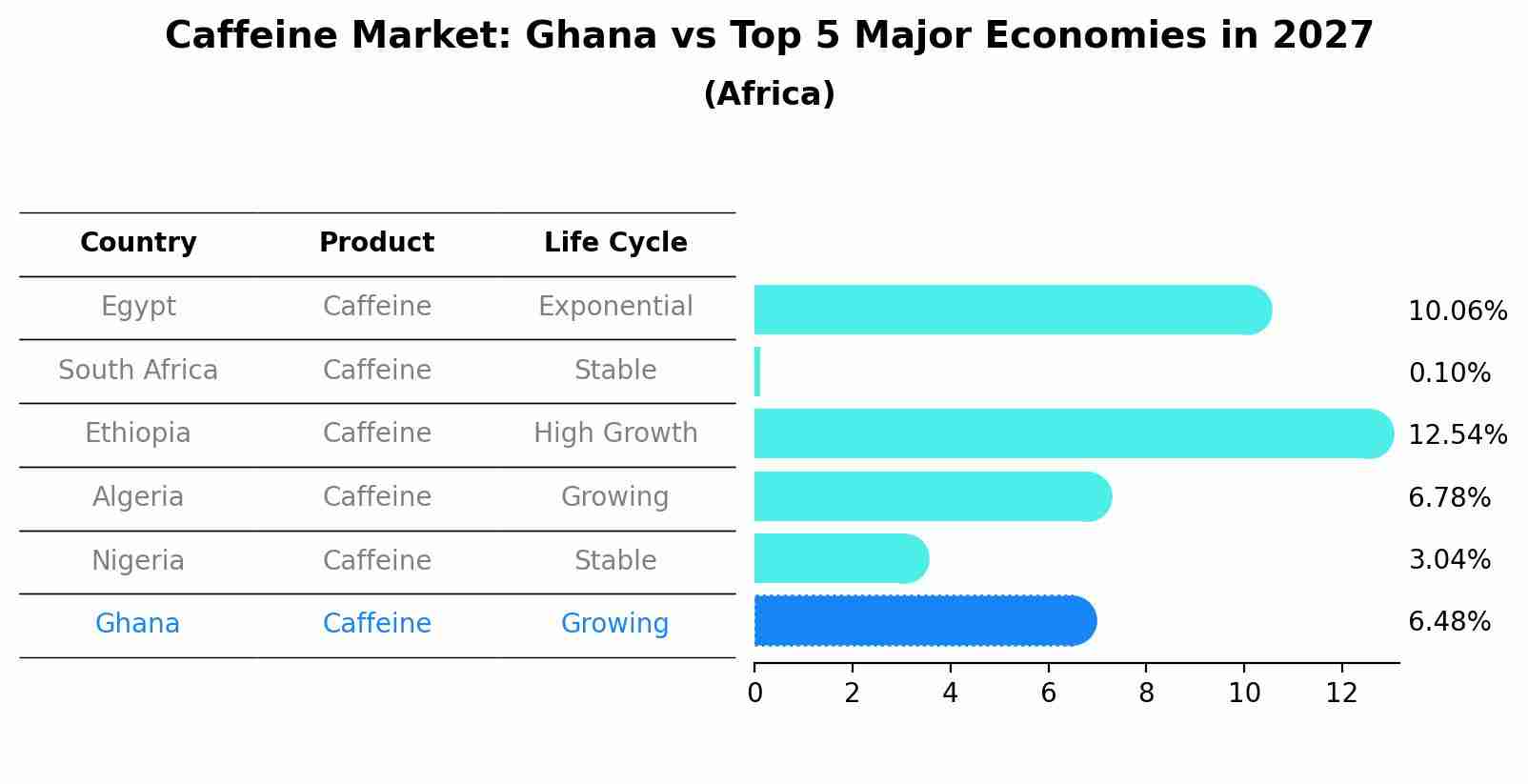Ghana Caffeine Market (2025-2031) Outlook | Size, Analysis, Value, Revenue, Forecast, Growth, Trends, Industry, Share & Companies
| Product Code: ETC110055 | Publication Date: Jun 2021 | Updated Date: Apr 2025 | Product Type: Report | |
| Publisher: 6Wresearch | Author: Ravi Bhandari | No. of Pages: 70 | No. of Figures: 35 | No. of Tables: 5 |
Ghana Caffeine Market Size Growth Rate
The Ghana Caffeine Market is poised for steady growth rate improvements from 2025 to 2029. From 4.78% in 2025, the growth rate steadily ascends to 14.79% in 2029.

Caffeine Market: Ghana vs Top 5 Major Economies in 2027 (Africa)
The Caffeine market in Ghana is projected to grow at a growing growth rate of 6.48% by 2027, within the Africa region led by Egypt, along with other countries like South Africa, Ethiopia, Algeria and Nigeria, collectively shaping a dynamic and evolving market environment driven by innovation and increasing adoption of emerging technologies.

Ghana Caffeine Market Overview
In Ghana, the Caffeine Market is experiencing growth driven by factors such as changing consumer lifestyles, coffee culture adoption, and beverage industry innovation. Caffeine, a natural stimulant found in coffee, tea, energy drinks, and dietary supplements, is valued for its alertness-boosting effects, sensory appeal, and functional properties, contributing to its consumption in Ghana beverage market and consumer products.
Drivers of the market
The caffeine market in Ghana is driven by its widespread use as a central nervous system stimulant in beverages, pharmaceuticals, and personal care products. Caffeine offers properties such as alertness, wakefulness, and cognitive enhancement, making it popular in products such as coffee, tea, energy drinks, and dietary supplements.
Challenges of the market
In Ghana, the caffeine market faces challenges such as agricultural sustainability, market volatility, and consumer health concerns. Caffeine, a natural stimulant found in coffee, tea, and various beverages and supplements, is a key ingredient in the food and beverage industry. However, ensuring the sustainable production of caffeine-rich crops, such as coffee beans and tea leaves, amid environmental pressures, climate change, and agricultural pests and diseases, may pose challenges for growers and producers. Moreover, managing market volatility and price fluctuations for caffeine commodities, influenced by factors such as weather conditions, global demand trends, and currency exchange rates, can impact profitability and investment decisions. Additionally, addressing consumer health and wellness concerns, including caffeine consumption guidelines, addiction risks, and product labeling requirements, is crucial for maintaining market confidence and regulatory compliance. Overcoming these challenges through sustainable agriculture practices, market diversification strategies, and consumer education initiatives is essential to support the growth of the caffeine market in Ghana and promote responsible consumption habits.
Government Policy of the market
Government policies in the caffeine market may focus on promoting consumer safety, product quality, and regulatory compliance. Initiatives might include regulations and standards for the production, labeling, and marketing of caffeine-containing products to ensure transparency and accurate information for consumers. Additionally, the government may conduct risk assessments and establish maximum allowable levels of caffeine in food, beverages, and dietary supplements to protect public health and safety. Capacity-building programs for food manufacturers and regulators on caffeine regulations and safety standards may also be promoted to enhance compliance and consumer protection.
Key Highlights of the Report:
- Ghana Caffeine Market Outlook
- Market Size of Ghana Caffeine Market, 2024
- Forecast of Ghana Caffeine Market, 2031
- Historical Data and Forecast of Ghana Caffeine Revenues & Volume for the Period 2021-2031
- Ghana Caffeine Market Trend Evolution
- Ghana Caffeine Market Drivers and Challenges
- Ghana Caffeine Price Trends
- Ghana Caffeine Porter's Five Forces
- Ghana Caffeine Industry Life Cycle
- Historical Data and Forecast of Ghana Caffeine Market Revenues & Volume By Type for the Period 2021-2031
- Historical Data and Forecast of Ghana Caffeine Market Revenues & Volume By Natural Caffeine for the Period 2021-2031
- Historical Data and Forecast of Ghana Caffeine Market Revenues & Volume By Synthetic Caffeine for the Period 2021-2031
- Historical Data and Forecast of Ghana Caffeine Market Revenues & Volume By Applications for the Period 2021-2031
- Historical Data and Forecast of Ghana Caffeine Market Revenues & Volume By Pharmaceuticals for the Period 2021-2031
- Historical Data and Forecast of Ghana Caffeine Market Revenues & Volume By Food for the Period 2021-2031
- Historical Data and Forecast of Ghana Caffeine Market Revenues & Volume By Beverages for the Period 2021-2031
- Historical Data and Forecast of Ghana Caffeine Market Revenues & Volume By Flavours and Fragrances for the Period 2021-2031
- Ghana Caffeine Import Export Trade Statistics
- Market Opportunity Assessment By Type
- Market Opportunity Assessment By Applications
- Ghana Caffeine Top Companies Market Share
- Ghana Caffeine Competitive Benchmarking By Technical and Operational Parameters
- Ghana Caffeine Company Profiles
- Ghana Caffeine Key Strategic Recommendations
Frequently Asked Questions About the Market Study (FAQs):
- Single User License$ 1,995
- Department License$ 2,400
- Site License$ 3,120
- Global License$ 3,795
Search
Thought Leadership and Analyst Meet
Our Clients
Related Reports
- Afghanistan Apparel Market (2026-2032) | Growth, Outlook, Industry, Segmentation, Forecast, Size, Companies, Trends, Value, Share, Analysis & Revenue
- Canada Oil and Gas Market (2026-2032) | Share, Segmentation, Value, Industry, Trends, Forecast, Analysis, Size & Revenue, Growth, Competitive Landscape, Outlook, Companies
- Germany Breakfast Food Market (2026-2032) | Industry, Share, Growth, Size, Companies, Value, Analysis, Revenue, Trends, Forecast & Outlook
- Australia Briquette Market (2025-2031) | Growth, Size, Revenue, Forecast, Analysis, Trends, Value, Share, Industry & Companies
- Vietnam System Integrator Market (2025-2031) | Size, Companies, Analysis, Industry, Value, Forecast, Growth, Trends, Revenue & Share
- ASEAN and Thailand Brain Health Supplements Market (2025-2031) | Strategy, Consumer Insights, Analysis, Investment Trends, Opportunities, Growth, Size, Share, Industry, Revenue, Segments, Value, Segmentation, Supply, Forecast, Restraints, Outlook, Competition, Drivers, Trends, Demand, Pricing Analysis, Competitive, Strategic Insights, Companies, Challenges
- ASEAN Bearings Market (2025-2031) | Strategy, Consumer Insights, Analysis, Investment Trends, Opportunities, Growth, Size, Share, Industry, Revenue, Segments, Value, Segmentation, Supply, Forecast, Restraints, Outlook, Competition, Drivers, Trends, Demand, Pricing Analysis, Competitive, Strategic Insights, Companies, Challenges
- Europe Flooring Market (2025-2031) | Outlook, Share, Industry, Trends, Forecast, Companies, Revenue, Size, Analysis, Growth & Value
- Saudi Arabia Manlift Market (2025-2031) | Outlook, Size, Growth, Trends, Companies, Industry, Revenue, Value, Share, Forecast & Analysis
- Uganda Excavator, Crane, and Wheel Loaders Market (2025-2031) | Strategy, Consumer Insights, Analysis, Investment Trends, Opportunities, Growth, Size, Share, Industry, Revenue, Segments, Value, Segmentation, Supply, Forecast, Restraints, Outlook, Competition, Drivers, Trends, Demand, Pricing Analysis, Competitive, Strategic Insights, Companies, Challenges
Industry Events and Analyst Meet
Whitepaper
- Middle East & Africa Commercial Security Market Click here to view more.
- Middle East & Africa Fire Safety Systems & Equipment Market Click here to view more.
- GCC Drone Market Click here to view more.
- Middle East Lighting Fixture Market Click here to view more.
- GCC Physical & Perimeter Security Market Click here to view more.
6WResearch In News
- Doha a strategic location for EV manufacturing hub: IPA Qatar
- Demand for luxury TVs surging in the GCC, says Samsung
- Empowering Growth: The Thriving Journey of Bangladesh’s Cable Industry
- Demand for luxury TVs surging in the GCC, says Samsung
- Video call with a traditional healer? Once unthinkable, it’s now common in South Africa
- Intelligent Buildings To Smooth GCC’s Path To Net Zero


















